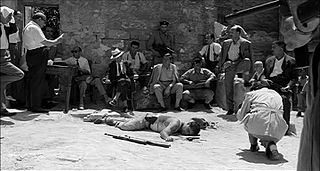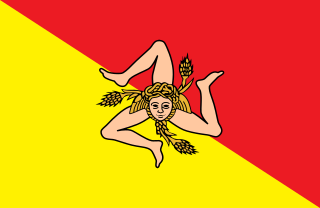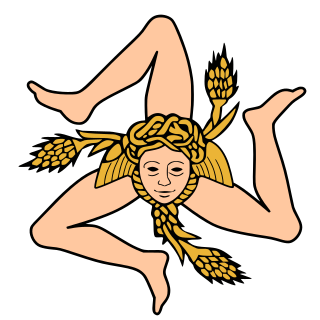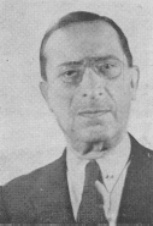
Sicily is the largest and most populous island in the Mediterranean Sea and one of the 20 regions of Italy. It is one of the five Italian autonomous regions and is officially referred to as Regione Siciliana. The island has 4.8 million inhabitants. Its capital city is Palermo. It is named after the Sicels, who inhabited the eastern part of the island during the Iron Age. Sicily has a rich and unique culture in arts, music, literature, cuisine, and architecture.

The unification of Italy, also known as the Risorgimento, was the 19th-century political and social movement that resulted in 1861 in the consolidation of various states of the Italian Peninsula and its outlying isles into a single state, the Kingdom of Italy. Inspired by the rebellions in the 1820s and 1830s against the outcome of the Congress of Vienna, the unification process was precipitated by the Revolutions of 1848, and reached completion in 1871 after the capture of Rome and its designation as the capital of the Kingdom of Italy.
Secession is the formal withdrawal of a group from a political entity. The process begins once a group proclaims an act of secession. A secession attempt might be violent or peaceful, but the goal is the creation of a new state or entity independent of the group or territory from which it seceded. Threats of secession can be a strategy for achieving more limited goals.

Salvatore Giuliano was an Italian bandit, who rose to prominence in the disorder that followed the Allied invasion of Sicily in 1943. In September of that year, Giuliano became an outlaw after shooting and killing a police officer who tried to arrest him for black market food smuggling, at a time when 70 percent of Sicily's food supply was provided by the black market. He maintained a band of subordinates for most of his career. He was a flamboyant, high-profile criminal, attacking the police at least as often as they sought him. In addition, he was a local power-broker in Sicilian politics between 1945 and 1948, including his role as a nominal colonel for the Movement for the Independence of Sicily. He and his band were held legally responsible for the Portella della Ginestra massacre, though there is some doubt about their role in the numerous deaths which occurred.

Lola Rodríguez de Tió was the first Puerto Rican-born woman poet to establish herself a reputation as a great poet throughout all of Latin America. A believer in women's rights, she was also committed to the abolition of slavery and the independence of Puerto Rico.

Giuseppe Schirò was an Arbëresh neo-classical poet, linguist, publicist and folklorist from Sicily. His literary work marked the transition from the Arbëresh language to modern Albanian literature in Italy. He was a major protagonist of the Rilindja, the Albanian cultural awakening or Albanian Renaissance, in Italy.

Salvatore Giuliano is a 1962 Italian drama film directed by Francesco Rosi. Using techniques of the documentary film, it recounts the criminal career of famous Sicilian bandit Salvatore Giuliano between 1943 and 1950, his death. In 2008, the film was included in the Italian Ministry of Cultural Heritage's 100 Italian films to be saved, a list of 100 films that "have changed the collective memory of the country between 1942 and 1978."

The flag of Sicily shows a triskeles symbol, and at its center a Gorgoneion with a pair of wings and three wheat ears. In the original flag, the wheat ears did not exist and the colors were reversed. The original flag was created in 1282 during the rebellion of the Sicilian Vespers.

Calogero "Don Calò" Vizzini was a Sicilian Mafia boss of Villalba in the province of Caltanissetta, Sicily. He was considered to be one of the most influential and legendary Mafia bosses of Sicily after World War II until his death in 1954. In the media, he was often depicted as the "boss of bosses" – although such a position does not exist in the loose structure of Cosa Nostra.

Mexican Institute of Sound is an electronic music project created by Mexico City-based DJ and producer Camilo Lara. Along with groups like Nortec Collective and Kinky, M.I.S. is part of a growing Mexican electronica movement, encouraging fusions of folk and more traditional music with modern sounds.
Inno al Re, disputed between Giovanni Paisiello and Pietro Pisani, was a hymn praising King Ferdinand IV of Naples, then Ferdinand I of Two Sicilies, which functioned as the national anthem of the kingdom of the Two Sicilies,.

The Movement for the Independence of Sicily was a separatist Sicilian political party originally active in Sicily from 1943 to 1951. Its best electoral result was in 1947, when it won 8.8% of the votes in the Sicilian regional election and had nine regional deputies elected.

Giuseppe Castellano was an Italian general who negotiated the Armistice between Italy and the Allies on September 8, 1943.

In Italy, there are some active movements and parties calling for autonomy or even independence for the areas comprised within the historical Kingdom of the two Sicilies: that is, Southern Italy and/or the region of Sicily. No political movement promoting these ideas has ever been successful in gaining traction among the population. The movement remains on the fringes with no representation in the Italian parliament.

Sicilian nationalism, or Sicilianism, is a movement in the autonomous Italian region of Sicily, as well as the Sicilian diaspora, which seeks greater autonomy or outright independence from Italy, and/or promotes further inclusion of the Sicilian identity, culture, history, and linguistic variety.

Andrea Finocchiaro Aprile was an Italian politician.

Concetto Gallo was a Sicilian politician who formed part of the Sicilian nationalist movement. He was one of the most popular leaders of Sicilian Separatism.
The Sicilian National Movement is a separatist coalition of parties active in Sicily.
















